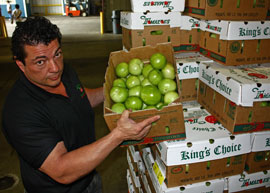 The FDA recently issued a revised industry guidance document titled: What You Need To Know About Administrative Detention of Foods; Small Entity Compliance Guide Utilizing a question and answer format, this industry guidance document contains some valuable information. Here are some of the highlights you need to know:
The FDA recently issued a revised industry guidance document titled: What You Need To Know About Administrative Detention of Foods; Small Entity Compliance Guide Utilizing a question and answer format, this industry guidance document contains some valuable information. Here are some of the highlights you need to know:
Why is administrative detention needed?
Administrative detention provides a means through which FDA can hold adulterated or misbranded food and prevent it from reaching the marketplace, thus further enhancing FDA’s ability to ensure the safety of food for U.S. consumers.
What food is subject to administrative detention?
The term food refers to (1) articles used for food or drink for man or other animals, (2) chewing gum, and (3) articles used for components of any such article (section 201(f) of the FD&C Act [21 U.S.C. § 321(f)]). The term food also refers to dietary supplements, which are to be treated as food under the FD&C Act (section 201(ff) [21 U.S.C. § 321(ff)]).
How long may FDA administratively detain an article of food?
FDA may detain an article of food for a reasonable period, not to exceed 20 calendar days, after the detention order is issued. However, an article of food may be detained for 10 additional calendar days if a greater period of time is required to institute a seizure or injunction action. The entire detention period may not exceed 30 calendar days (21 CFR 1.379).
What criteria does FDA use to order an administrative detention?
An officer or qualified employee of FDA may order the administrative detention of any article of food that is found during an inspection, examination, or investigation under the FD&C Act if the officer or qualified employee has reason to believe that the article of food is adulterated or misbranded (21 CFR 1.378).
May an administratively detained article of food be delivered to another entity or transferred to another location?
It is a prohibited act under section 301(bb) of the FD&C Act [21 U.S.C. 331(bb)] to transfer an article of food subject to an administrative detention order and/or to alter or remove any mark or label that identifies an article of food as administratively detained.
Can an administrative detention order be modified?
FDA may approve a request for modification of an administrative detention order to allow for the destruction of the article of food or movement of the detained article of food to a secure facility, to maintain or preserve the integrity or quality of the article of food, or for any other purpose that the authorized FDA representative believes is appropriate in the case (21 CFR 1.381(c)).
What’s the difference between an import detention and administrative detention?
FDA’s authority to administratively detain food under section 304(h) of the FD&C Act [21 U.S.C. 334(h)] is separate and distinct from detention that may occur during FDA’s import admissibility review. Under section 801(a) of the FD&C Act [21 U.S.C. 334(h)], when food is imported or offered for import into the United States, FDA conducts an admissibility review to determined whether to admit the product into United States or detain the product.
On the other hand for administrative detentions under section 304(h) of the FD&C Act, FDA will issue an order to the owner of the suspect food notifying him that FDA is administratively detaining the food and that he has an opportunity to appeal the detention with or without a hearing (see 21 CFR Part 1 Subpart K).
When does an administrative detention order terminate?
If FDA terminates an administrative detention order or the detention period expires, an authorized FDA representative will issue an administrative detention termination notice to any person who received the detention order (or that person’s representative), releasing the article of food, as quickly as possible. If FDA fails to issue an administrative detention termination notice and the detention period expires, the administrative detention is deemed to be terminated (21 CFR 1.384).
Who pays the costs associated with the detention order, such as storage, moving, disposal or reconditioning?
As stated in the preamble to the 2004 final rule (69 Federal Register 31659 at 31690), the party or parties responsible for paying the storage costs of food that FDA orders administratively detained is a matter between the private parties involved with the food. FDA is not liable for those costs. An owner, operator, or agent in charge of the place where the food is located can always request modification of a detention order to destroy the food if they do not want to store it.
Please take the time to read the entire guidance document. It contains information about your rights and other deadlines that become very important if your product is administratively detained.




